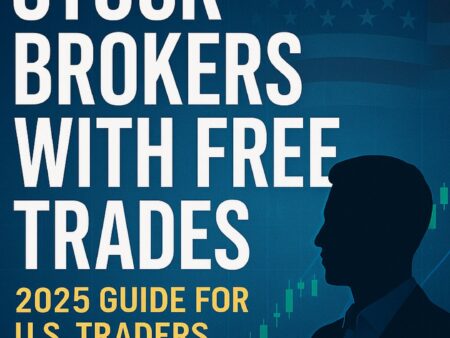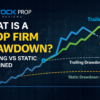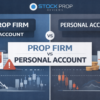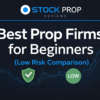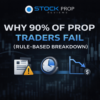If you’re a beginner or intermediate trader in the U.S. looking for a reliable, easy-to-use, and low-cost trading platform, you’ve likely come across Robinhood and Webull. Both platforms have surged in popularity over the past few years thanks to their commission-free trading models and mobile-first designs. But which one is best for your needs?
In this in-depth guide, we’ll compare Robinhood vs Webull across all key areas — pricing, user experience, features, research tools, and more — to help you make an informed choice.
We’ll also introduce an exciting alternative: prop trading firms like TradeThePool that let you start trading without risking your own capital.
Why This Comparison Matters
Choosing the right broker is one of the most important decisions a new trader can make. The right platform can:
- Save you money on fees
- Offer tools that match your trading style
- Improve your execution speed
- Provide better market data and research
Whether you’re looking to build a long-term portfolio or get into short-term swing or day trading, your broker can make or break your experience.
Quick Overview: Robinhood vs Webull
| Feature | Robinhood | Webull |
|---|---|---|
| Commission-Free | Yes (Stocks, ETFs, Options) | Yes (Stocks, ETFs, Options) |
| Crypto Trading | Yes | Yes |
| Margin Trading | Yes (via Robinhood Gold) | Yes |
| Options Trading | Yes | Yes |
| Platform Type | Mobile-first, Simple UI | Advanced Charts, Desktop App |
| Best For | Beginners | Intermediate & Active Traders |
| Fractional Shares | Yes | Yes |
| Paper Trading | No | Yes |
| IRAs | Yes | No |
Robinhood Overview
What Is Robinhood?
Robinhood pioneered commission-free trading in the U.S., opening the markets to millions of new retail traders. Its clean interface and simple onboarding process have made it the go-to app for new investors.
Key Features:
- $0 commission on stocks, ETFs, and options
- Crypto trading with no account minimum
- Fractional share investing
- Robinhood Gold ($5/month for margin, Level II data, and larger instant deposits)
- IRAs with a 1% match
Pros:
- Extremely beginner-friendly UI
- Zero minimum deposit
- Fractional shares and recurring investments
- Integrated crypto trading
- Offers IRA with match
Cons:
- Limited charting and analysis tools
- No paper trading
- Past reliability and outage concerns
Robinhood is best for trading beginners or long-term investors who want simplicity and ease of use.
Webull Overview
What Is Webull?
Webull offers commission-free trading but stands out with its professional-level tools, advanced charting, and in-depth market analytics. It caters more to active traders and investors looking for technical insights.
Key Features:
- $0 commissions on stocks, ETFs, and options
- Built-in technical indicators and screeners
- Desktop and mobile platforms with multi-chart layout
- Paper trading feature
- Extended-hours trading (pre-market and after-hours)
- Crypto trading available
Pros:
- Advanced charting and order types
- Great for day and swing traders
- Paper trading for strategy testing
- Real-time data and indicators
- Fully featured mobile and desktop apps
Cons:
- Learning curve for new users
- No retirement account options
- Limited customer service
Webull is best for intermediate to advanced traders who rely on technical analysis and want more control over their trading experience.
Comparing Features Side-by-Side
1. Ease of Use
- Robinhood wins for simplicity — it’s ideal for beginners.
- Webull has more features but requires some learning.
2. Research & Tools
- Webull offers more screeners, technical indicators, and news feeds.
- Robinhood provides basic research and news articles.
3. Charting
- Webull has advanced charts with drawing tools and indicators.
- Robinhood’s charting is very basic.
4. Mobile Experience
- Both have strong mobile apps.
- Robinhood is easier for new users, Webull offers more depth.
5. Customer Support
- Both offer chat and email support, but response times can vary.
Pricing & Margin Comparison
| Platform | Stock/ETF Fees | Options Fees | Crypto Fees | Margin Rates | IRA Option |
| Robinhood | $0 | $0 | Spread-based | ~12% (with Gold Plan) | Yes (1% match) |
| Webull | $0 | $0.55/contract | Spread-based | ~9.49% | No |
- Winner for Margin: Webull
- Winner for IRA Investing: Robinhood
Which Platform Is Right for You?
Choose Robinhood If You:
- Are brand new to investing
- Prefer simplicity over technical depth
- Want to invest passively
- Need an IRA account
Choose Webull If You:
- Are an active trader
- Rely on technical indicators
- Want to paper trade strategies
- Need pre-market and after-hours access
Can You Trade Without Capital? Consider Prop Firms
If you’re ready to trade but don’t have a large deposit, you’re not alone. Many new traders face this challenge.
Many traders are also exploring TradeThePool stock prop firm in 2025 — these stock prop firms fund traders, so you can trade with little or no deposit.
Why Choose a Prop Firm Like TradeThePool?
- No large deposit needed when trading with a prop firm
- Get funded up to $260,000
- Evaluation-based funding (pass the challenge and start trading)
- Keep a share of the profits
- Trade from home on U.S. stocks
Prop firms help you get funded to trade remotely. It’s a perfect option if you have skills but not the capital.
Check out: tradethepool.com
FAQ: Robinhood vs Webull
1. Are Robinhood and Webull free to use?
Yes. Both offer commission-free trading on stocks, ETFs, and options.
2. Which is better for day trading?
Webull is better for day traders due to its advanced tools and extended trading hours.
3. Can I trade crypto on Robinhood or Webull?
Yes. Both offer cryptocurrency trading with no account minimum.
4. Which platform has better charting tools?
Webull offers more technical indicators and customizable charting options.
5. Can beginners use Webull?
Yes, but there’s a learning curve. Robinhood is more beginner-friendly.
6. Does either platform offer retirement accounts?
Only Robinhood offers IRAs with a 1% match.
7. Can I start trading without any money?
Yes, with a prop firm like TradeThePool, you can get funded to trade without using your own capital.
8. Are these platforms safe?
Both are regulated and offer secure trading environments, including SIPC protection.
Final Thoughts
Both Robinhood and Webull are among the best trading platforms in the U.S. for different types of users. Robinhood is ideal for beginners looking for a clean, easy-to-use platform. Webull is the better choice for active and technical traders who want deeper tools.
Looking for a way to trade without using your own money? Explore the top-rated stock prop firm tradethepool.com — and start your trading journey today.
